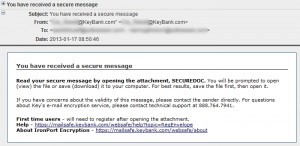18 Jan “Secure Message” Scam Targets Victims in Email Malware Attack
Secure Message Scam Targets Victims in Email Malware Attack
We all hate getting spam — unwanted junk email — in our email inboxes, but in this case, it’s not just unsolicited ads clogging your inbox, it’s a vicious virus attack.

An example of the secure message scam email, care of NakedSecurity.
A new twist on an old scam has victims of a malicious software attack download a computer virus through an email attachment disguised as a secure message from banks and other firms. Be wary of emails with a subject line that says something similar to “You have received a secure message,” and then attempt to get you to download ZIP files (such as securedoc.zip) to read the message. A trojan virus, known as Troj/Zbot-DPM, could be inside and used to get control of your computer.
Computer security site NakedSecurity wrote a blog post giving detailed information on the malware spam attack.
What is a Trojan Virus?
Remember the tale of the Trojan War, where the Greeks build a large, wooden horse and hid soldiers inside? The people of Troy, thinking the horse was a gift, brought it through their impenetrable gates. Once inside, when the people of Troy least expected it, the Greek soldiers unleashed their attack and gained a swift victory. That’s essentially what’s happening when you download this “secure message” ZIP file — you’re allowing a virus to infect your computer and give control of it to some unknown computer criminals.
What to do if you receive this secure message scam
First of all, don’t click on the link inside or open any attachments that come with it. Simply delete the email and you should be ok. Even if the message looks clear or is from a source you trust, it could be a spoof set up by the scammers. Unless you fully trust the source and can identify the contents, you should be extremely wary.
If you’ve already clicked on the link, downloaded the file and suspect you may be infected, it’s not too late to correct the problem. Just give us a call at 570.474.5100, and we can set up an appointment to do a full virus removal on your computer.


